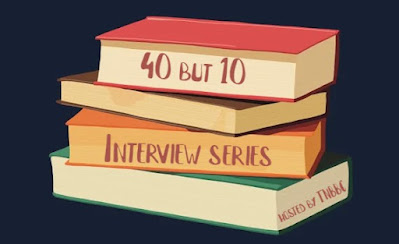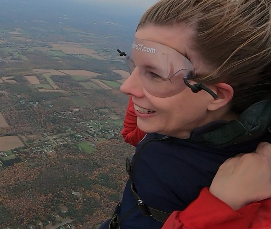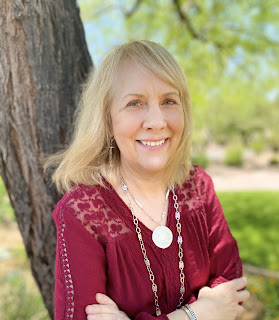April flew by in the blink of an eye. That said, I managed to outread last month, with a whopping 12 books! I have no idea how I pulled that off but I'm certianly not complaining. Two of those were books I read for publicity purposes, so they won't appear here on this list.
Ok! Let's check out what I read!!
Maeve Fly by CJ Leede
I was so close to DNFing around the 40% mark because the book was just moving along sooo slowly but I'm glad I hung in there. The last 30% more than made up for it!
In it, we meet Maeve - ice princess at a famous theme park by day, depraved murderer by night. No, seriously. She spends her evenings sexing it up with men she meets in California dive bars, and brutally mutilates people from time to time to satisfy her inner "wolf". It starts with Hilda, the home aid who upsets Maeve when she tries to convince her that it's time to let her very ill and comatose grandmother go. She tricks the woman into following her down to the basement and swings a mace into her skull. Then she meets her work-bestie's brother Gideon and falls into a twisted and violent relationship with him. And it just gets grosser and gorier from there.
File this one under extreme horror - prepare yourself for pipes and mice, curling irons as sex toys, and dangling eyeballs, for starters. This will most defintely not be for everyone. But for those of you who it IS for... I see you.

The Empress of Salt and Fortune by Nghi Vo
I'm not entirely sure what I just listened to. I'm almost ashamed to admit that I restarted the audio about halfway through because I wasn't sure I was following along correctly, but a second listen didn't seem to clear things up too much more for me. A cleric named Chih is sent out, or just decided to set out, to record history and encounters a woman named Rabbit, who was hand-maiden to an Empress. From there, most of the book is Rabbit tellling Chih all about her time with the Empress and the ways in which the Empress broke the mold and bucked the expectations of her role, I think.
Fucking hell if I know, though. And I guess I'm in it for the long haul, regardless, because I bought the first three audiobooks in this series as a bundle on Chirp because they sounded pretty rad.
Shrugs.
At least they're short, right?!
The Salt Grows Heavy by Cassandra Khaw
A stunning novella.
In it, we travel alongside a mute mermaid and a mysterious plague doctor as they move through snowy, unfamilar territory. When they stumble across a group of children playing a murderous game of "pig", they are brought before the children's keepers, a threesome of sinister surgeons referred to as "the saints". These surgeons are terrible beings, doing terrible things, and our two companions quickly realize that they must rely on one another if they plan to survive.
This is definitely not your disney brand mermaid, folks. You won't want to get on this one's bad side. Trust me.
The Salt Grows Heavy is lush and lyrical, dark and disturbing, and chock full of blood and body horror. You'll not want to miss this one!
Parasite by Darcy Coates
My husband walked into my antilibrary and saw me staring at my stacks of unread books. He asked what I was doing and I told him I was trying to pick my next read. He said he wanted to pick it for me and chose this one based solely on the title. And what a choice it was!
While the book was quite chunky (clocking in at over 420 page), it read like lightning. Coates wastes no time getting the action going and once it starts, there's no stopping it!
Told in five separate stories from five different outposts, all detailing the same catastrophic alien takeover, we're initially introduced to a small group of women stationed on a remote moon, doing a sweep of the surface to extinguish any lifeforms that may have travelled there on random space junk or comets and asteriods. These lifeforms are typically non-threatening, non-sentient plant life or sludgy stuff that, if left undealt with, could infest the planet and gunk up their equipment.
While on a routine tour around the moon, one of the women comes into contact with something they've never seen before - a large black gooey entity with exploratory tentacles that launches itself at her when she comes within range. There's a struggle, a lot of screaming, and the diagonstics from her suit show that its integrity has been compromised. One of her partners races to her location in an attempt to save her, but the goo tries to attack her as well, and she has no recourse but to flee to the safety of the base. Shortly after, the initial woman knocks at the air lock begging to be let in. Only it's not her. Not really.
How do you fight a monster who looks and sounds like the people you know and love? One that can mimic them to a T, their memories and mannerisms?
Space horror for the win!
Confession - I've only read this and SA Barnes' Dead Silence, but I want more! What other space horror novels would you recommend I pick up?

Nothing But the Rain by Naomi Salman
Nothing But the Rain is a strange apocalyptic novella clocking in at just under 100 pages. Perfectly digestible on this lazy Easter Sunday afternoon.
In it, we follow Laverne, who is keeping a daily journal to remind herself of all the things she might forget. She can't remember when it started. No one can. But they do know that for every drop of rain that hits your skin, you'll lose a recent memory, though there's no way to know which ones it'll take. Stand outside long enough and the rain will wash you clean... completely.
What she does know is that they're quarantined. And it rains every. single. day. And that they have a buddy system in place where neighbors go out to check on other neighbors, dressed up in whatever they can concoct to protect themselves from the wet. They still have power, and food, and bottled water but no cell service. TV's not running either. And the soliders stationed outside the town borders are shooting anyone who approaches. Is this some deranged government experiment? Or a new chemical weapon? Or the beginning of the end of the world?
Laverne writes it all down. Not in the hopes of figuring it out. She's not necessarily seeking answers. She just wants to ensure she survives.
What's intriguing about Nothing But the Rain is that we're limited so strictly to Laverne's experience that we find ourselves questioning what is reality vs what could be the delusions of an old woman. It's tender and tense and atomospheric at all once.
Highly recommend.

Sorrowland by Rivers SolomonSorrowland brings a crap ton to the table - the treatment of black americans, individual sexuality and identification, cultist behavior, trauma, albinoism, and government sanctioned testing on humans - so much so that, as you might expect when you try to juggle too many things at once, the story starts to crumble under the weight of everything it's trying to convey.
Without giving too much away, we meet Vern, our protagonist, who is hiding in the woods as she gives birth to twins. She has escaped her husband, who is the leader of the bizarre cultish community she has been raised in, and is doing her best to survive. She is haunted by strange visions and is being hunted by an unknown fiend. As she and her children try to make a home for themselves in the forest, Vern becomes sick with something that is slowly devouring her while simultaneously changing her, both inside and out.
Forced out of hiding, she tracks down two women who knew her childhood friend Lucy, who had also managed to escape Blessed Acres, and with their help uncovers a truth that will crack her, and her understanding of the things she's experiencing, wide open.
While I didn't hate Sorrowland, I also didn't really love it. I guess I had high expectations for it and it fell a little flat, which was disappointing. The storytelling itself was somewhat unbalanced, with some parts that chugged along more quickly than others. And there was a really weird and rather long section in the book where Vern is in the throws of a particularly strong vision and she interacts with the "ghosts" while having phone sex with the woman she is developing a relationship with. While it's not the only sexual encounter in the book, it was a very odd one and I wasn't sure what value it added to the overall storyline, other than just making us uncomfortable.
I'd love to hear what you thought if you read it!

Troll by Dave FitzgeraldTold in second person, Troll is a brick of a book, clocking in at 580 pages, and delves deep into the mind of an honest-to-god asshole. Oh, sorry. Deep into YOUR mind. Because you're the asshole. And there is no escaping yourself. There's also no escaping all the porn and drugs and bowel movements and, well... did I mention assholery?
We know you. We've met someone like you. We've found ourselves caught up in the web of inescapable conversations with someone like you. Hell, we've run screaming in the opposite direction from someone like you. You're a dick. A weirdly charming but incredibly obnoxious dick. You're an insufferable movie buff with a penchant for pissing other people off. You take the opposite side in every arguement just to get under people's skin. And the one time you find someone who might be willing to put up with your shit, someone who is able to go head to head with the bullshit that constantly spews out of your mouth, you know you're going to fuck it up. You'll full out sabotage it. Because you just can't help yourself, can you?
I can't tell if this review makes it sound as if I didn't like the book. I did! I'm a big fan of Whiskey Tit and the books they put out. And I'm glad to have had the opportunity to support Dave and his new novel! It would have been a solid 4 star read if it hadn't occasionally gotten sidetracked, deviating down rabbit holes and spending pages upon pages on full-out rants. I am not ashamed to admit that I'd find myself skimming a lot of those. I mean, man, already faced with such a heavy page count, I just couldn't afford the time or eye strain (oh if I had a dime for every time my eyes rolled of their own accord, lol) and wanted to get back to the debauchery and aforementioned assholery!

The Net Beneath Us by Carol Dunbar
This was a book I requested from the publisher, thinking it was going to be more about living off the grid and survivalist fiction. Instead, I found myself reading some pretty dark grief fiction. And I didn't hate it!
It focuses on a happily married woman who appears to have it all, and her two young kids, and how thier entire world is turned upside down in the wake of her husband's horrific logging accident. Paralyzed and non-responsive, they make the tough decision to take him off the ventilator. And when he doesn't die, she allows her 'in-laws', with whom she has a strained relationship, to convince her to continue treatment for him, which will only prolong his inevitable death.
Living out in the middle of nowhere, in a half finished house they were building from scratch, she is now faced with finishing what she and her husband started, something she is terribly ill eqipped for, or running back to her old life of comfort.
A very powerful debut that intertwines the beauty of the natural world, and our relationship with trees, into a bleak story about motherhood and parenting and loss.

The Great Transition by Nick Fuller GooginsIn The Great Transition, we follow teenaged Emi and her mother and father, Kristina and Larch, as they continue to acclimate within the post-Transition world. Some backstory for context: sixteen years ago the world was on the verge of a full out collapse, referred to as The Crisis. Rather than allow climate criminals to continue to poison the earth, pockets of workers, migrants, and refugees across the globe stood together to save the planet. And Emi's parents were key proponents of that famous revolution.
Now, as Day Zero arrives, a holiday in which everyone parties in the streets together to celebrate the reversal of the Crisis, an unexpected attack takes place in the heart of their city and Emi's mother goes missing. The storyline abruptly shifts from climate fiction to eco-thriller as Emi and her father try to locate Kristina and in the process, begin to realize just how little they know her or understand the kind of danger they both may be in.
Told in flip-flopping storylines that alternate between the perspectives of Emi and Larch, while also bouncing between past and present to build up the reader's understanding of the historic roles both Kristina and Larch played during the Crisis, the flashback chapters became a frequent source of frustration. The deeper into the book we got, the more the flashbacks appeared, which interuppted the forward momentum we were experiencing in the present chapters and created a very choppy, start-and-stop reading flow to the novel.
In spite of that, The Great Transition warns us of the risks of becoming complacent, of ignoring the damage we're causing or waiting for someone else to take it on as "their problem". It's a dystopian survivalist story that shows us what's potentially to come if we continue to choose momentary comforts over a more planet-healthy and sustainable way of life.

The Reason I'm Here by Jarrod CampbellListen to this description: his short fictions "traverse the spaces and purposes assumed by the gay male, not least his own" and are meant to subvert standard queer behavior "in favor of honest explorations of desire, amnesia, voyeurism, betrayal, physicality, grief, faith, and uncertainty". I mean, damn, right?!
The opening and title story is the best of the bunch and a great way to kickstart the collection. In it, a man passes out on the street and awakens to no knowledge of who or where he is, with only muscle memory carrying his legs home. His husband is by his side through all the testing as they try to figure out what caused his fainting and amnesia, and slowly feeds him their history little by little, but everything seems a little... off. How do you trust the one you're supposed to love the most when you can't remember a thing? In another, a young taxi driver picks up a stranger who is pining for his lover, and delivers him to an abandoned building only to have him disappear and leave him fareless. When he returns back to base, he recounts the weird encounter to his uncle only to discover he is not alone with his experience. And in the longest story of them all, we meet a young boy who falls hard for the small town pastor until he catches him in bed with an evil entity that appears to have its own sort of power over him.
While the rest of the stories stand up well on their own merit, they don't hold a torch to these three. Together, they tease the reader with a greater sense of strangeness or wrongness, and that made them more intriguing to me. The others were more straight up - stories of wanting and longing, of making the tough decison to help or hurt someone, of obsessing over someone you can't have, of the shocking realization that no good deed goes unpunished....
Jarrod Campbell writes with a precise hand, giving us a sneak peek into the darker, animalistic nature of men and I think we're pretty ok with it.












.jpg)

















